MercoPress. South Atlantic News Agency
Tag: recession
-
Tuesday, May 28th 2019 - 09:47 UTC
Rationing, long queues and empty shelves in Cuba as the economy heads to recession

As long lines outside shops with mostly bare shelves are increasingly common in Cuba, and the government has indeed signaled that things are going from bad to worse, Havana is blasting president Donald Trump's administration for the hardship and misery.
-
Wednesday, April 17th 2019 - 09:58 UTC
Argentina's inflation 54.7% in 12-months; more monetary “contraction measures” and support from IMF

Argentina's inflation rate accelerated for the third straight month in March, the government statistics agency said on Tuesday, prompting the central bank to unveil fresh measures to temper raging inflation and protect the embattled peso currency.
-
Thursday, April 4th 2019 - 09:43 UTC
Argentina requests waiver ahead of IMF's third review to further release funds

Argentina has requested a waiver from the International Monetary Fund as some data would not be available in time for the fund's third review this week of US$ 56.3 billion in standby financing agreed last year, a Treasury spokesman said on Wednesday.
-
Tuesday, April 2nd 2019 - 09:50 UTC
Sales of new cars in Argentina crash 50% in first quarter of the year

Sales of new cars in Argentina collapsed by almost 50% in the first quarter of 2019, the Association of Automobile Dealers of Argentina (ACARA) said Monday. Sales fell by 49.5% in the year-on-year comparison, with purchases down 50.4% in March year-on-year too, said ACARA.
-
Thursday, March 28th 2019 - 09:39 UTC
Argentine Peso slides to an all time low and country risk climbs to almost 800 points
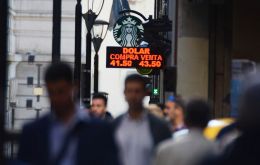
The Argentine Peso slid to all-time lows against the dollar as concerns about inflation, weak growth and October's presidential election weighed. The currency has lost 14% so far this year and the weakness raises fears of a repeat of the currency crisis of 2018 when the Peso lost half its value against the dollar.
-
Wednesday, March 27th 2019 - 20:54 UTC
Dollar rises in Uruguay while tension increases in Argentine markets

In Uruguay, the dollar traded at noon on the state bank Banco Republica (Brou) board at $ 33.20 for the purchase and $ 34.60 for the sale, 45 cents above the close price on Tuesday. On the board of private exchanges, the currency to the public came to sell at $ 34.80 and $ 34.90.
-
Saturday, March 16th 2019 - 10:15 UTC
IMF prepared to help Argentina stabilize exchange market volatility in election year
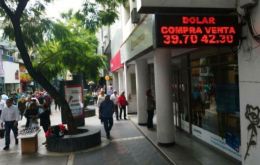
Argentina’s central bank wants to license market makers to help stabilize its embattled peso currency when the Treasury starts newly announced dollar sales in April. The bank hopes the market makers, dealers who agree to buy and sell at set prices, would bolster liquidity in the exchange market to help avoid the sharp gyrations the peso has suffered in recent weeks when it hit a record low of 42.5 pesos per dollar in thin trading.
-
Friday, March 8th 2019 - 08:58 UTC
Argentina's Peso hit a record low to the dollar weakening 4%
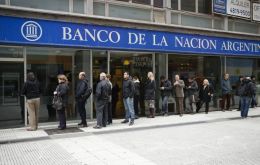
Argentina’s struggling currency hit a record low against the dollar on Thursday, weakening over 4% to close at 42.5 pesos per dollar, a challenge for President Mauricio Macri as he looks to right the economy ahead of elections in October.
-
Thursday, February 28th 2019 - 09:18 UTC
Argentina's economic activity dropped 2.6% in 2018, says Indec
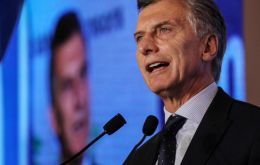
Argentina's economic activity fell 2.6% in 2018 versus the previous year, government statistics agency Indec said on Wednesday, underscoring the turmoil that dragged the country into recession last year.
-
Friday, February 1st 2019 - 11:15 UTC
Italian economy in recession, and likely to continue during the year
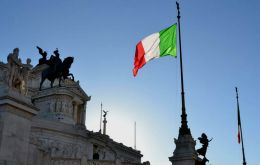
Italy's economy tipped into recession at the end of last year, according to latest figures. In the final three months of 2018, the economy shrank by 0.2%, following a 0.1% decline in the third quarter, the Istat statistics office said. Italian Prime Minister Giuseppe Conte said the contraction was likely to continue into 2019.
